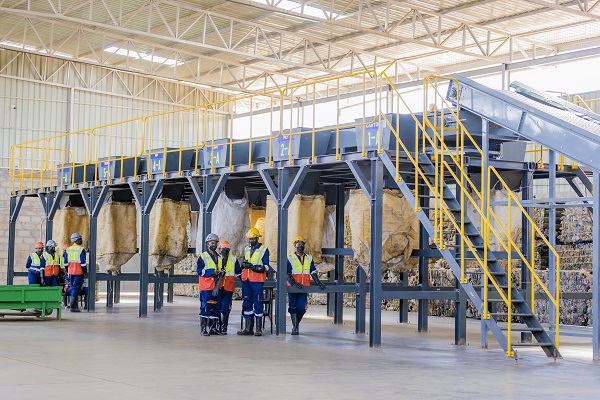 Pilot installations for the valorisation of municipal waste;
Credit: GGGI
Pilot installations for the valorisation of municipal waste;
Credit: GGGI
Luxembourg's Ministry of the Environment, Climate and Biodiversity, the Global Green Growth Institute (GGGI) and the Republic of Rwanda have announced the inauguration of pilot municipal waste valorisation facilities at Nduba dumpsite.
On Wednesday 19 June 2024, the Ministry of Environment of Rwanda and the GGGI inaugurated these facilities at the Nduba landfill. These facilities consist of critical equipment and infrastructure, built as part of the collaborative "Waste to Resources Project: Improving Municipal Solid and Hazardous Waste Management in Rwanda", which ran from July 2021 to July 2024.
With funding from Luxembourg's Ministry of the Environment, Climate and Biodiversity, this initiative reportedly marks a significant step in Rwanda's journey towards sustainable waste management and a dynamic circular economy. Among the newly inaugurated infrastructures are:
- Waste Sorting and Separation Facility: Capable of handling 100 tonnes per day, this facility is expected to significantly improve waste management efficiency by enhancing the sorting and separation of recyclable products at Nduba;
- Bio-Waste Treatment Facility: With a handling capacity of five tonnes per day, this facility will convert organic waste into organic fertiliser;
- Truck Weighbridge: Capable of weighing trucks up to 60 tonnes, this infrastructure is operational and will ensure the accurate measurement of waste entering the Nduba landfill as well as waste diverted to the newly established infrastructure.
In addition to other project activities, a household waste sorting pilot project, awareness campaigns and capacity-building initiatives have been implemented over the past three years.
Four reverse vending machines (RVMs) will "soon" be strategically installed in the City of Kigali (Rwanda's capital) to improve the collection of recyclable materials by incentivising consumers to deposit used plastic bottles, glass bottles, tin cans and e-waste in exchange for rewards.
Moreover, a Refrigerant Gas Reclamation System has been installed within the Enviroserve Rwanda Green Park in the Bugesera Industrial Park. This system safely reclaims and recycles refrigerant gases, reducing harmful emissions from non-functional cooling appliances and promoting environmental sustainability.
These initiatives demonstrate the collaborative efforts between the Rwandan and Luxembourg governments together with the GGGI, as well as the "transformative power of international partnerships to address environmental challenges and foster sustainable development", noted the three partners.
"Waste should be viewed as a raw material for valorisation, not as waste. This mindset will transform the sector and help the country achieve its long-term vision of carbon neutrality," said Dr Valentine Uwamariya, Rwanda's Minister of Environment.
"Luxembourg is strongly committed to environmental protection, at the national and international level, supporting development cooperation projects but also a number of initiatives abroad through our international climate funding. In doing so, I am delighted that we can count on the valuable support of partners such as the GGGI. The 'Waste to Resources' project in Rwanda is a perfect example of how environmental protection can be combined with the creation of new circular economic opportunities that benefit the entire Rwandan population," noted Xavier Bettel, Luxembourg's Deputy Prime Minister, Minister for Foreign Affairs and Foreign Trade and Minister for Development Cooperation and Humanitarian Affairs, during the inauguration, in which he participated on behalf of Luxembourg's Minister of the Environment, Climate and of Biodiversity, Serge Wilmes.
"Today, I am very happy that the 'Waste to Resources' project is reaching its final stage with the handover of several waste valorisation facilities to the City of Kigali. These new facilities are designed for the residents of Kigali. They will modernise waste management in the city. They are the fruit of an innovative partnership between Luxembourg and Rwanda," commented Minister Wilmes.
"By challenging the current prevailing 'collect and throw away' approach and instead promoting greater circularity in waste management in Kigali, the project's interventions do more than just mitigate emissions from waste, but also promote the creation of green jobs and economic opportunities," added Caroline Raes, Rwanda representative at the GGGI.
According to the partners, this pilot project has boosted Rwanda's efforts to establish a sustainable and circular waste management system, offering significant benefits for communities and the environment. The project's holistic approach will reduce waste deposited at the Nduba landfill, improve e-waste management and create enabling environments for sustainable waste practices. These achievements are expected to create a learning curve to scale similar initiatives and highlight Rwanda's commitment to achieving a zero-waste circular economy by 2035.
Reducing greenhouse gas (GHG) emissions is a key objective of the project, with an estimated annual reduction of 15,320 tCO2 expected to be achieved once all facilities are operating at full capacity. The pilot facilities will also create 74 new green jobs and improve access to municipal solid waste services for 250,000 people.








